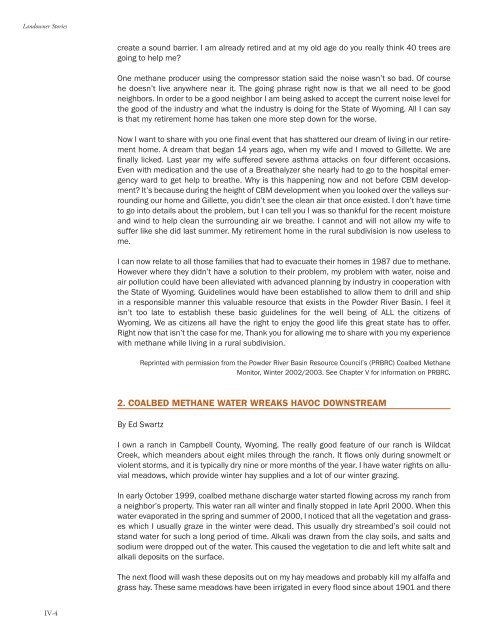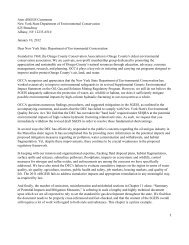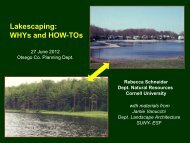Oil and Gas at Your Door? (2005 Edition) - Earthworks
Oil and Gas at Your Door? (2005 Edition) - Earthworks
Oil and Gas at Your Door? (2005 Edition) - Earthworks
Create successful ePaper yourself
Turn your PDF publications into a flip-book with our unique Google optimized e-Paper software.
L<strong>and</strong>owner Stories<br />
cre<strong>at</strong>e a sound barrier. I am already retired <strong>and</strong> <strong>at</strong> my old age do you really think 40 trees are<br />
going to help me?<br />
One methane producer using the compressor st<strong>at</strong>ion said the noise wasn’t so bad. Of course<br />
he doesn’t live anywhere near it. The going phrase right now is th<strong>at</strong> we all need to be good<br />
neighbors. In order to be a good neighbor I am being asked to accept the current noise level for<br />
the good of the industry <strong>and</strong> wh<strong>at</strong> the industry is doing for the St<strong>at</strong>e of Wyoming. All I can say<br />
is th<strong>at</strong> my retirement home has taken one more step down for the worse.<br />
Now I want to share with you one final event th<strong>at</strong> has sh<strong>at</strong>tered our dream of living in our retirement<br />
home. A dream th<strong>at</strong> began 14 years ago, when my wife <strong>and</strong> I moved to Gillette. We are<br />
finally licked. Last year my wife suffered severe asthma <strong>at</strong>tacks on four different occasions.<br />
Even with medic<strong>at</strong>ion <strong>and</strong> the use of a Bre<strong>at</strong>halyzer she nearly had to go to the hospital emergency<br />
ward to get help to bre<strong>at</strong>he. Why is this happening now <strong>and</strong> not before CBM development?<br />
It’s because during the height of CBM development when you looked over the valleys surrounding<br />
our home <strong>and</strong> Gillette, you didn’t see the clean air th<strong>at</strong> once existed. I don’t have time<br />
to go into details about the problem, but I can tell you I was so thankful for the recent moisture<br />
<strong>and</strong> wind to help clean the surrounding air we bre<strong>at</strong>he. I cannot <strong>and</strong> will not allow my wife to<br />
suffer like she did last summer. My retirement home in the rural subdivision is now useless to<br />
me.<br />
I can now rel<strong>at</strong>e to all those families th<strong>at</strong> had to evacu<strong>at</strong>e their homes in 1987 due to methane.<br />
However where they didn’t have a solution to their problem, my problem with w<strong>at</strong>er, noise <strong>and</strong><br />
air pollution could have been allevi<strong>at</strong>ed with advanced planning by industry in cooper<strong>at</strong>ion with<br />
the St<strong>at</strong>e of Wyoming. Guidelines would have been established to allow them to drill <strong>and</strong> ship<br />
in a responsible manner this valuable resource th<strong>at</strong> exists in the Powder River Basin. I feel it<br />
isn’t too l<strong>at</strong>e to establish these basic guidelines for the well being of ALL the citizens of<br />
Wyoming. We as citizens all have the right to enjoy the good life this gre<strong>at</strong> st<strong>at</strong>e has to offer.<br />
Right now th<strong>at</strong> isn’t the case for me. Thank you for allowing me to share with you my experience<br />
with methane while living in a rural subdivision.<br />
Reprinted with permission from the Powder River Basin Resource Council’s (PRBRC) Coalbed Methane<br />
Monitor, Winter 2002/2003. See Chapter V for inform<strong>at</strong>ion on PRBRC.<br />
2. COALBED METHANE WATER WREAKS HAVOC DOWNSTREAM<br />
By Ed Swartz<br />
I own a ranch in Campbell County, Wyoming. The really good fe<strong>at</strong>ure of our ranch is Wildc<strong>at</strong><br />
Creek, which me<strong>and</strong>ers about eight miles through the ranch. It flows only during snowmelt or<br />
violent storms, <strong>and</strong> it is typically dry nine or more months of the year. I have w<strong>at</strong>er rights on alluvial<br />
meadows, which provide winter hay supplies <strong>and</strong> a lot of our winter grazing.<br />
In early October 1999, coalbed methane discharge w<strong>at</strong>er started flowing across my ranch from<br />
a neighbor’s property. This w<strong>at</strong>er ran all winter <strong>and</strong> finally stopped in l<strong>at</strong>e April 2000. When this<br />
w<strong>at</strong>er evapor<strong>at</strong>ed in the spring <strong>and</strong> summer of 2000, I noticed th<strong>at</strong> all the veget<strong>at</strong>ion <strong>and</strong> grasses<br />
which I usually graze in the winter were dead. This usually dry streambed’s soil could not<br />
st<strong>and</strong> w<strong>at</strong>er for such a long period of time. Alkali was drawn from the clay soils, <strong>and</strong> salts <strong>and</strong><br />
sodium were dropped out of the w<strong>at</strong>er. This caused the veget<strong>at</strong>ion to die <strong>and</strong> left white salt <strong>and</strong><br />
alkali deposits on the surface.<br />
The next flood will wash these deposits out on my hay meadows <strong>and</strong> probably kill my alfalfa <strong>and</strong><br />
grass hay. These same meadows have been irrig<strong>at</strong>ed in every flood since about 1901 <strong>and</strong> there<br />
IV-4




